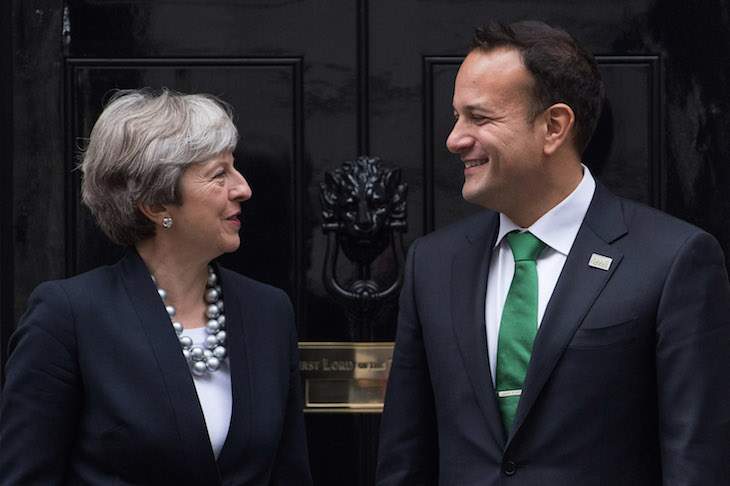In his column this week, James Forsyth reports there is ‘mounting anger’ inside the government at the way the Irish government are behaving over Brexit. I am sure there is, though it still surprises me that people are surprised to discover that the Irish government is defending its own interests.
Doubtless this is why you will sometimes find exuberant Brexiteers suggesting that the answer to the Irish problem is for the Irish to leave the EU too. That might work in theory; it doesn’t do so in practice. I’m afraid things are a little more complicated than that.
Now it is, of course, tiresome that Brexit is being complicated by the Hibernians. But none of this was unforeseeable and none of it should be a surprise. That it evidently is – and an unwelcome one at that – seems sadly typical of a Brexit process that has, at leas thus far, been built on heroic amounts of projection and wishful thinking.
One need only listen to what David Davis and Boris Johnson have said about the Irish Question to understand that the Irish have thought longer and harder about this than their British counterparts. Sometimes you get the impression the existence of an EU-frontier still surprises London. But then Northern Ireland is usually only – and at best – an afterthought. Of us, but not quite of us and certainly different enough for the difference to count.
Tone matters, however, and the message being received in Dublin is that the British expect the troublesome Micks to pipe down and get in line. Small things matter more than you might like them to. When David Davis’s officials send emails to the Irish asking for a meeting with ‘Kenny’ you can’t quite be sure whether this is a demonstration of rudeness (the meeting would be with ‘the Taoiseach’) or ignorance (the then-Taoiseach’s forename is Enda). Either way, it seems like a fail.
Throughout this process, British ministers have said they have no desire for a ‘hard border’. Nor, of course, do the Irish. But leaving the single market and customs union requires a pretty solid border and none of the blithe assurances to the contrary emanating from Whitehall do anything to change that. Blather about ‘technology’ churns no butter.
The Irish view, I’m afraid, is that they didn’t start this and the onus therefore falls on the British to sort it out. This does not seem an altogether unreasonable view for a mess that, regardless of how it is resolved, cannot avoid complicating life for the Irish.
Political instability in Dublin does not help. Leo Varadkar’s minority coalition depends on Fianna Fáil’s confidence-and-supply support. That support is in doubt as Varadkar’s deputy prime minister, Frances Fitzgerald, faces calls for her resignation in the latest episode of a long-running scandal involving a Garda whistleblower. The possibility that Varadkar’s government could fall is real. That would dissolve the Dáil and require fresh elections in December, or more probably, January.
No Irish politician, then, can be seen to concede ground on the border issue. Not because, contrary to some suggestions in the UK, Sinn Féin is driving the process but because there is a striking unanimity across Ireland’s political parties that doing so is not in the national interest.
The Irish, however, are acutely conscious that if the border issue is not resolved now, Irish leverage diminishes once the the Brexit talks move on to other matters. The French – who have their own longstanding issues with the Irish anyway – seem unlikely to privilege Irish interests over their own. The strength of the Irish position is strictly time-limited. This, just as much as anything else, worries Dublin.
Meanwhile, ‘Regulatory equivalence’ between Northern Ireland and the Republic, as proposed by the Brexit department, means regulatory equivalence between the UK (or part of if) and the EU. It is hard to see how or why this would be acceptable to everyone else in Europe even if it might please the UK and the Republic.
Setting aside concerns about the Northern Irish peace process – concerns which are as much about mood as anything else (though mood is important), the Irish concern rests upon the appreciation that east-west trade is more important to the Irish economy than north-south trade. That leaves them thinking they are going to be screwed whatever happens (a suspicion likely to be correct) which in turn gives Dublin little reason to take a more ‘flexible’ line on the border issue.
In no other area, however, is the Brexiteer suggestion that everything must change so not very much will change quite so obviously threadbare. Repeated suggestions that leaving the EU doesn’t need to mean real change on the island of Ireland are a kind of con. That was always baloney; it’s baloney on stilts now. The DUP, whatever their other limitations, at least understand that.
So does the Tory party. Northern Ireland, so often accorded a unique kind of status, cannot be afforded any such identity now. There must be no difference between Belfast and Birmingham. The logic of Brexit demands this too.
James Forsyth writes that ‘Dublin is taking a huge risk with its hardline approach’ and this is something well-understood in Ireland too. But the Irish position is not altogether unreasonable. It is asking the British government to honour promises made by the British government. Viewed from Dublin’s perspective, this is not outrageous.
The difficulty is that the British government cannot honour those pledges while also delivering a Brexit which means Brexit in the way the government has chosen to define Brexit. That, the Irish will say, is hardly Ireland’s fault and perhaps London should have thought about that before assuring everyone Brexit would be easy.







Comments